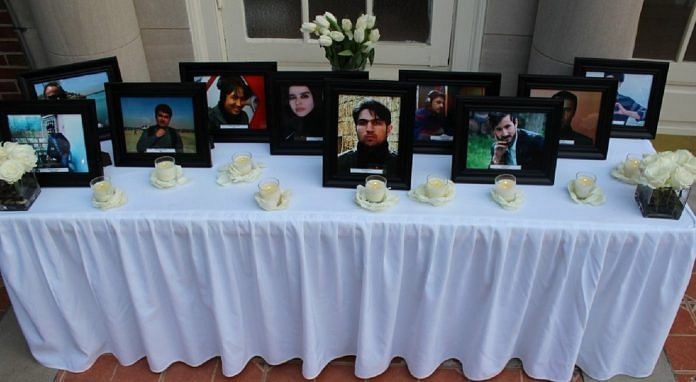Afghan Ambassador S.M. Abdali says attacks are a setback for the freedom of expression in Afghanistan.
New Delhi: The suicide bombings in Afghanistan that killed 11 journalists Monday were an “attack on global media”, the country’s ambassador to India S.M. Abdali has said.
In Kabul, nine journalists lost their lives in a suicide attack. Hours later, two more journalists were killed in a similar attack in Kandahar. The suicide blasts, described as the single most lethal attack on the media since the fall of the Taliban, came just two days before the World Press Freedom Day.
“The message was clear: to shut down the voice of justice, equality and democratic values,” Abdali said while addressing journalists at the Foreign Correspondents’ Club in Delhi, Friday.
The ambassador said that the attack was also targetted against the Afghan youth and the generation entering the workforce after 2001.
Abdali said that the attack was a setback for the freedom of expression in Afghanistan, which he said, has achieved a lot in the past 16 years.
He said that the independence of the media is guaranteed by Article 34 of the Afghan constitution and maintained that that Afghan media is the “freest of the region”.
Citing the progress of the telecommunication sector and the internet in the past 16 years, he said that Afghanistan now has over 100 television news channels and 1000 print publications. Twenty million people now have digital access in the country, said Abdali.
He added that Afghanistan doesn’t distinguish between men and women and that the government was dedicated to the cause of free and open media. Of the nine journalists killed in Kabul, one was a woman.
Responsibility of global media
ISIS has claimed responsibility for Monday’s twin attacks. Abdali claimed both Taliban and ISIS come from the “same sources”, referring to a “common objective” that the two groups are pursuing.
“We hope all our neighbours will fight the common cause and fight against terrorism,” he said.
He also called on global media to stand in solidarity with the country, to fight against a “common cause”.
“There is a responsibility of global and regional media to join hands and uplift the media of other countries,” he added.
A spokesperson from India’s external affairs ministry called Monday’s attack a “shocking surprise”. Saying that the Indian government stands in solidarity with Afghanistan, he expressed hope for a peaceful resolution to the civil strife in the war-torn country.
Regional cooperation and trade
When asked about having a dialogue with the Taliban to end the war and violence, Abdali said that the government currently has a two-pronged approach — a state-to-state dialogue with Pakistan, and a private dialogue with Taliban. According to Abdali, the first approach is preferable as the “solution lies with Pakistan”.
He stressed that that Pakistan is “crucial” when it comes to negotiating with Taliban.
He said his government “fully welcomes” the joint venture in Afghanistan by India and China, and was hopeful that Pakistan will support the effort as well.
Afghanistan has diversified its trade links with countries like India by operating out of the Chabahar port in Iran, which has been functional since the first shipment of wheat reached successfully in October 2017.







MIRVAIZ SUN
APNI GALI MAE TO KUTTA BHI SHER HOTA HAI
UP AANA TAB BATAUNGA